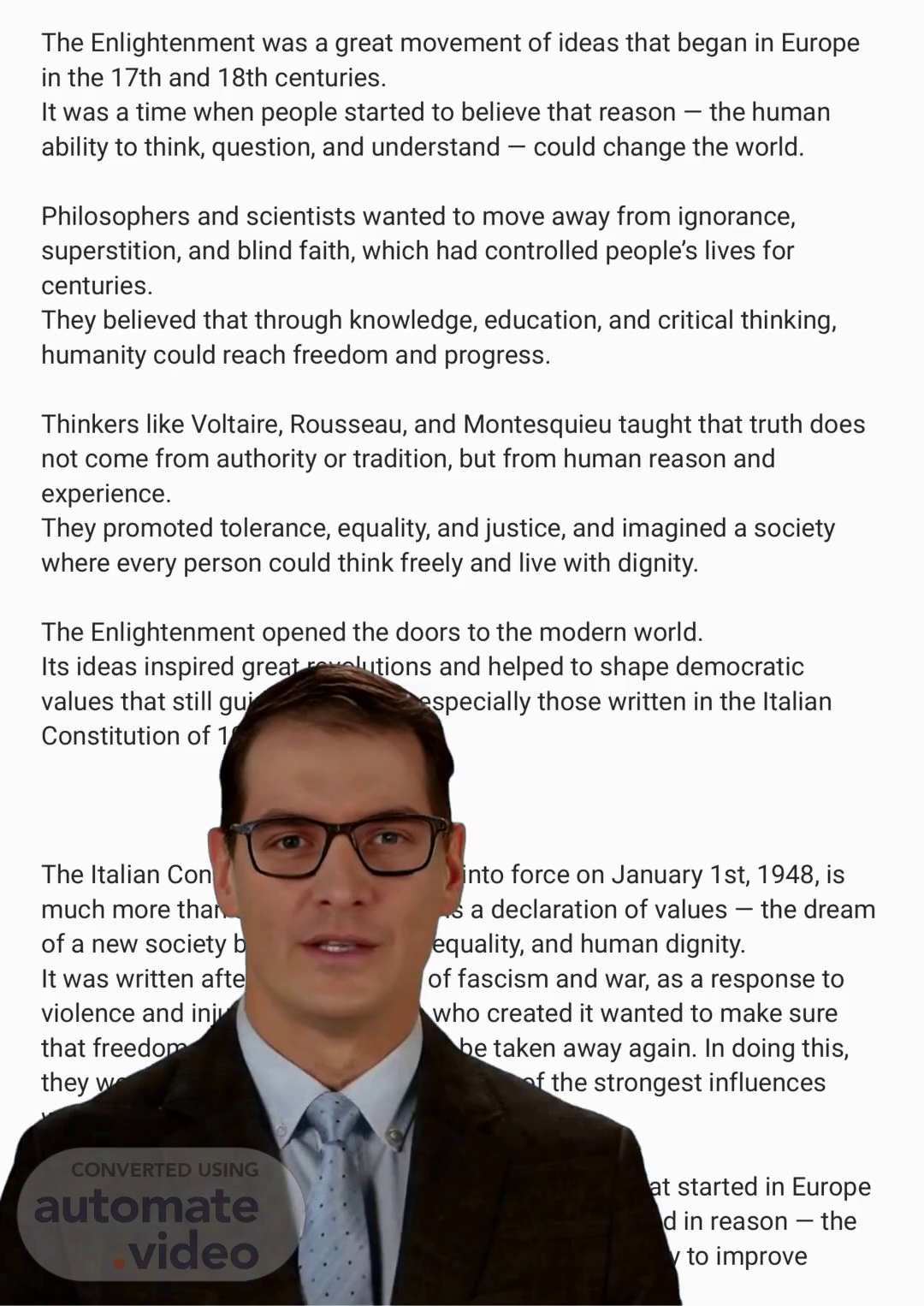Scene 1 (0s)
[Virtual Presenter] The Enlightenment was a major intellectual movement that took place in Europe during the 17th and 18th centuries. During this period, people began to believe that reason could have a significant impact on the world. Philosophers and scientists sought to move away from ignorance, superstition, and blind faith, which had dominated people's lives for centuries. They believed that through knowledge, education, and critical thinking, humanity could achieve freedom and progress. Key thinkers such as Voltaire, Rousseau, and Montesquieu emphasized that truth does not come from authority or tradition, but rather from human reason and experience. They advocated for tolerance, equality, and justice, and envisioned a society where individuals could think freely and live with dignity. The Enlightenment laid the groundwork for the modern world, inspiring numerous revolutions and shaping democratic values that continue to influence our society today. The Italian Constitution, which went into effect on January 1st, 1948, reflects these ideals, enshrining freedom, equality, and human dignity as fundamental principles. Written in response to the atrocities of fascism and war, the constitution aimed to ensure that these freedoms would never be revoked. The Enlightenment's ideas played a significant role in shaping this document, serving as a powerful inspiration for its creators..
Scene 2 (1m 33s)
[Audio] The text describes the main ideas of the Enlightenment period, specifically its emphasis on human rights, equality, and popular sovereignty. It highlights how these ideas were incorporated into the Italian Constitution, particularly in articles 2, 3, and 1. These articles recognize and protect individual rights, promote equality, and establish the principle of popular sovereignty, where power resides with the people rather than a monarch or elite group. The text emphasizes the importance of responsibility and cooperation among citizens in achieving true freedom and equality. The Italian Constitution incorporates several key principles from the Enlightenment period, including human rights, equality, and popular sovereignty. Article 2 of the constitution states that all individuals are equal before the law and have the right to participate in public life. Article 3 of the constitution establishes the principle of popular sovereignty, stating that power resides with the people rather than a monarch or elite group. Article 1 of the constitution recognizes the fundamental rights of individuals, including the right to life, liberty, and security of person. The articles work together to create a framework for protecting individual rights and promoting social justice. The concept of popular sovereignty is central to the Italian Constitution, emphasizing the idea that power rests with the people rather than a monarch or elite group. This concept is reflected in Article 3 of the constitution, which explicitly states that power resides with the people. The protection of individual rights is also an essential aspect of the constitution, as stated in Article 1. The promotion of equality is another key principle, as highlighted by Article 2 of the constitution. The Italian Constitution's emphasis on human rights, equality, and popular sovereignty has had a lasting impact on the country's development. The articles that incorporate these principles have been instrumental in shaping the country's values and institutions. The protection of individual rights and the promotion of equality have contributed to a more just and equitable society. The concept of popular sovereignty remains a cornerstone of the Italian Constitution, ensuring that power remains with the people..
Scene 3 (4m 1s)
[Audio] The protection of people's freedom is carried out carefully, through democratic institutions and the rule of law, so that people's freedom is protected in a responsible way. This represents a modern interpretation of the Enlightenment's dream of political liberty. Freedom is indeed the core of both the Enlightenment and the Italian Constitution. Voltaire passionately defended the freedom of thought and religion, stating that without it, there would be no humanity. The Constitution fully acknowledges this idea by protecting personal freedom through Article 13, guaranteeing freedom of religion through Article 19, and giving everyone the right to express their thoughts freely through Article 21. These rights transform the Enlightenment's vision of a free human being into reality. The Enlightenment also championed the right to property as part of personal freedom. The Italian Constitution recognizes this right in Article 42, but introduces a novel concept: the idea of social function. This means that property cannot be used in a self-serving manner; instead, it must contribute to the common good. Therefore, economic freedom is acknowledged, but it must be balanced with social justice — another significant evolution of Enlightenment thought. Another crucial legacy from the Enlightenment is the separation of powers, an idea from Montesquieu. The Italian Constitution is grounded in this principle, with the Parliament making laws, the Government enforcing them, and the Judiciary ensuring justice. Furthermore, additional institutions, such as the Constitutional Court and the President of the Republic, safeguard the equilibrium between powers and defend citizens' rights. This reflects the Enlightenment's conviction in a rational, legal government — not one based on personal authority or tyranny..
Scene 4 (5m 56s)
[Audio] The Italian Constitution builds upon the Enlightenment ideals by incorporating additional key elements such as solidarity, social justice, and responsibility. These components enhance the original principles of liberty, equality, reason, and human dignity, creating a more comprehensive framework for governance. By doing so, the Constitution transforms idealistic concepts into tangible realities, fostering a society grounded in mutual respect, active participation, and profound human dignity. Furthermore, the Constitution serves as a guiding force, emphasizing the importance of protecting and continually striving for freedom and justice. Its enduring influence underscores the significance of safeguarding these fundamental rights and promoting a culture of responsibility and social cohesion..
